The UNCRC in a Global Pandemic
Some advice for Early Years Educators on upholding the articles whilst the children are at home.
On April 15th, the UN stated ‘Children are not the face of this pandemic, but they risk being among its biggest victims.’ (Source https://www.lrb.co.uk/blog/2020/may/a-child-rights-crisis). I also discovered this article which highlights some of the challenges that our own children are facing right now.
I found this statement, and the report, powerful and sobering. I felt a sudden responsibility, not only in my professional role, but also in my role as a citizen, to explore how we could all work collaboratively to ensure that all children were receiving the rights to which they are entitled.
Some of you were on your rights respecting schools’ journey, or had already received some level of the award, and there is no reason that this good work cannot be carried on during this period of lockdown. With the UNCRC due to be implemented into Scottish law, it is the responsibility of us as practitioners to ensure that the children in our care are receiving these rights. This may seem like it has nothing to do with us in the current climate, with the vast majority of children out of settings in their own homes, but there are things we can to do support parents if we think a little bit creatively.
We can begin by refreshing our memories of what the articles of the convention are – statements that may have been familiar to us on the walls of our settings, but we may not be seeing them every day at the moment.
https://www.savethechildren.org.uk/content/dam/global/reports/uncrc-child-friendly-version1.pdf
Reading the articles I realised that never before has the UNCRC been more pertinent than in this global pandemic. Compared with many countries across the world, the majority of our children, on the whole, have had their rights pretty well met – for example the right to free, high quality education for all and access to benefits that can assist in enabling carers to meet the children’s most basic needs of food and shelter. But suddenly there are many more families who are affected by the pandemic, that may find themselves far less able to fully provide some of these rights.
I am going to be focusing on a few of the articles below, which have struck me as relevant, but I would be so interested to hear about which articles you have worked on in your settings and they ways in which you have implemented them remotely.
Alongside the UNCRC, we must consider Maslow’s hierarchy of needs and be mindful that some children are further down the pyramid due to lockdown than they were pre lockdown. Those basic needs at the bottom are the ones that need to be met first in order for all of the others to happen. There have been heart warming examples of volunteers from settings creating stalls in community areas with resource banks of basic things to help their children.
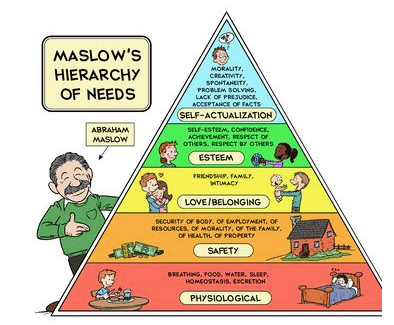
- The Right to and Education/The Right to Play – Articles 28 and 31
With school closed for most children, much of the implementation of the child’s education is down to the parent/carers. Many parents are juggling this education with childcare and working from home and are becoming burnt out. (Most) parents aren’t trained teachers or Early Years Practitioners, and they shouldn’t be expected to be. When setting home tasks for the children, please also be mindful of parental mental health. Children need resilient adults around them to model how to calmly deal with difficult situations. Why not offer some nice, relaxing ideas that families can enjoy together? I offered some examples in my previous blog (https://blogs.glowscotland.org.uk/ea/tapteamwebsitemain2019/2020/04/22/wednesday-22nd-april-childrens-and-parents-mental-health-in-lockdown/). If someone in your setting has been trained in implementing peer massage, why not share some of these techniques that families can do with each other? Try to minimise activities that require lots of resources or set up. Parents may not have the resources available and this may cause feelings of inadequacy when they see other families on social media.
One of the best ways for young children to learn is through play. Children are in a fully engaged state of mind when the motivation comes from within them. My colleague wrote a wonderful piece about joining in with our children’s play.
You can also encourage busy parents to involve their children in their household chores – merging learning and jobs that need to be done. My colleague wrote a piece on this here.
Below are some pictures of real-life examples of learning – where the adult simply observed and joined in with the play of the children – there was no set up of resources, and nothing bought in especially.
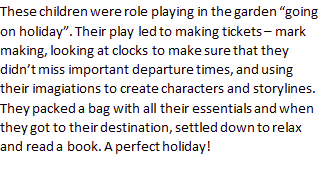



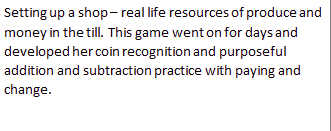
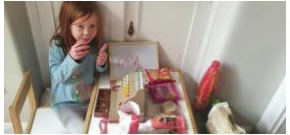
- The right to good health – including mental health – Article 24
Physical health is at the forefront of our lives at the moment. Parents and professionals are rightly emphasising the importance of good hygiene to protect ourselves and those around us. We must also consider balancing this with our children’s mental health. Whilst we want children to have an awareness of the importance of good hygiene, we do not want that to be at the detriment of their mental health. There are some fantastic resources created by professionals out there, which help to make children aware in a reassuring way and this website have collated some of those.
https://www.nhsggc.org.uk/kids/supporting-children-and-young-people-during-covid-19/
Some children may be suffering with their self confidence at this time. Parents may have been in a very different educational system when they were children themselves, and lack confidence working with a new curriculum which seems alien to them. Reiterate the importance of play and HWB. A lot of parents are aware of the importance of Literacy and Numeracy, but do emphasise that in order to learn, children need to have their wellbeing needs met (Remember Maslow!) I found this lovely book that can be shared (there is a video reading of it so the physical book is not needed) and it is a lovely way for families to value their individual strengths.
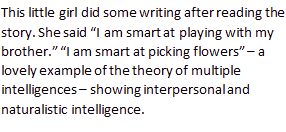

https://www.youtube.com/watch?v=UeUIm7BVLA0
I thought that this – https://covid19.nhsgrampian.org/wp-content/uploads/2020/04/COVID-19-Resource-pack-For-Parents.pdf is a lovely resource from a parental point of view. It was created by CAMHS professionals and helps adults to help their own mental health so that they can help that of their children.
- The right to having their voices heard and Freedom of expression – Articles 12 and 13
The book You Choose (Nick Sharratt and Pippa Goodheart https://www.amazon.co.uk/You-Choose-Pippa-Goodhart/dp/0552547085) is a wonderful way to bring to life articles 12 and 13 of the UNCRC. It epitomises children’s choice and agency and is one of my favourite books that I think lends itself well to the UNCRC. It was included in the Bookbug packs for a period of time, so many households may have it already and I have certainly seen it used in many settings. Maybe as a setting you could create some learning experiences around this book if it is available or around this idea? There are some examples on the site below.
Gently reiterate to parents the importance of hearing children’s thoughts and feelings at this time. This may not always be apparent if parents are so focused on the protection rights of their children in difficult times (Article 3) You could suggest that they begin a diary of thoughts and feelings which they may (or may not) choose to share with you – this could help transitions when the time comes to return.
UNICEF state that “Children themselves show remarkable resilience, creativity and adaptability, yet they are rarely consulted on decisions that affect their lives directly, especially in a crisis. Young people from all backgrounds should have the opportunity to influence the decisions made during this time to ensure they reflect their best interests” When it comes to designing the recovery curriculum, it is our responsibility as practitioners to find a way to meaningfully consult with the children in our care to best meet their needs. Maybe we could all start a conversation about how we are going to achieve this in our settings?
- The Right to being with Friends – Article 15
During lockdown this right is particularly hard to implement as children and adults are restricted from meeting friends and family. During our daily exercise, we cycled past friend’s houses, texting them when we were outside and holding up notes. That smile and wave from a friend was enough to lift spirits. If accessible, technology is also a good way to stay in contact though be mindful of your child’s reaction to this. My own is very sceptical and anxious about using video conferencing. You could pre-record messages or send pictures or written letters if that is the case. See if you can think of some ways that the children in your setting may be able to connect with their friends if they choose to.

- The right to privacy – Article 16
With whole households suddenly at home, space can be limited and children could be missing out on their right to privacy with nowhere to go. Worried parents could understandably be wanting to probe more into the lives of their children. Suggest that older children could maybe have a lockable notebook where they can record their thoughts in any way they want, encourage space and alone time throughout the day and be mindful with sharing learning online – make the adults aware of this right and ensure that they seek permission before they share any photographs online. Maybe as a setting, you could have a discussion about how families are sharing their learning and how private it is whilst still bearing in mind the right of the parents to make the right decisions based on their own child?
- The right to media and protection from media
There is so much negative media at the moment around Covid-19 and however much we shield children from actually consuming this media, they will pick up on the general mood and tone of adults in anxious times. There are various resources which explain current affairs in a reassuring and child friendly manner and some have been recommended above.
Share the message that too much media can be damaging, not just for the child’s mental health but that of the adult too. Reinforce the message to “switch off” at points during the day. Promote non screen activities such as: Reading books together, taking advantage of the weather and ability to go for walks outside of the home, put on some music and have a family dance party.
I hope that you have found my collection of ideas interesting. I am sure that you will have many of your own ideas for supporting the UNCRC in these uncertain times and I would really like to hear about them!
Emma x

